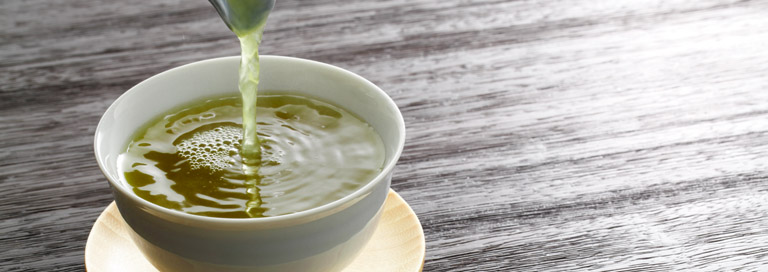I tell my patients there’s a good reason why countries like Japan, China, and South Korea have some of the lowest cancer rates in the world.
Two words: green tea.
In one breakthrough study, researchers from the University of Arizona Cancer Center found that chemicals in green tea dramatically boosts your body’s metabolic defense against toxins that can cause cancer.1
The study, published by the American Association for Cancer Research, proved that catechins — a type of natural antioxidant found in green tea — increase the gene expression of glutathione S-transferase (GST) enzymes by as much as 80%.
These powerful GST enzymes then convert toxic carcinogens into non-toxic chemicals, rendering them harmless.
A number of studies also show that epigallocatechin gallate, or EGCG, an especially potent catechin in green tea, is a powerful weapon against multiple types of cancer — both as a primary prevention and as further prevention after cancer treatment.
Here are just a few of the cancer types against which green tea has been shown to be highly effective.
- Skin cancer2
- Prostate cancer 3
- Breast cancer 4
- Lung cancer 5
- Colorectal cancer 6
- Stomach cancer 7
But despite numerous studies showing EGCG’s potency as a healer, the FDA has condemned its inclusion in a number of products. And Big Pharma has ignored it because green tea is a natural substance that can’t be patented.
Meanwhile, studies have also shown that as a scavenger of free radicals, EGCG can prevent and repair cell damage. It also combats the effects of pollution, sunlight, and smoking on skin.
In many parts of Asia, green tea is a beverage consumed as commonly as water, many times per day.
The Arizona Cancer Center found that the anti-cancer effects of green tea catechins kick in at between 8 and 16 cups per day.
It’s the beverage of choice
for people who want to live a long and healthy life.But as usual, Big Food has jumped on the bandwagon to make money by hawking poor-quality tea in pretty bottles.
In their relentless drive for profit, drink makers have churned out dozens of brands of bottled green tea with the aim of cashing in on the beverage’s reputed healing power.
The trouble is that almost all of these teas are a waste of good water — because Big Food’s processing has stripped the most powerful ingredient in green tea.
A report by ConsumerLab.com, the independent tester which verifies the quality of many of my own products, recently revealed the truth about four brand-name, bottled green teas.8
Only one brand they tested delivered anywhere close to my recommended dosage of 50 mg EGCG a day. In the three other brands they tested, EGCG measured significantly lower.
I suggest brewing your own tea using high-quality loose tea. A brand called Teavana Green Tea Gyokuro had the most EGCG, with 86 mg per serving.
- Bring 8 ounces of water to a full boil in a kettle.
- Add 1 to 1½ rounded teaspoons of green leaves to the kettle.
- Let the brew steep for about 5 minutes.
- Pour through a tea strainer into your cup and enjoy.
A quick note… You may enjoy the taste of milk in your green tea, but I don’t recommend it. A study found that adding milk to green tea reduces the availability and effectiveness of antioxidants in the drink. You can also take EGCG supplements. I recommend you get around 1,500 mg a day. Split them between meals and take about 30 minutes after eating.
To Your Good Health,

Al Sears, MD, CNS
References:
1. Chow SHH, et al. “Effects of repeated green tea catechin administration on human cytochrome P450 activity.” Cancer Epidemiol Biomarkers. 2007. 15(12):2473-6.
2. Katiyar S. “Skin photoprotection by green tea: antioxidant and immunomodulatory effects.” Curr Drug Targets Immune Endocr Metabol Disord. 2003 Sep;3(3):234-42.
3. Gupta S, et al. “Inhibition of prostate carcinogenesis in TRAMP mice by oral infusion of green tea polyphenols.” Proc Natl Acad Sci USA. 2001;98:10350–10355.
4. Gianfredi V, et al. “Green tea consumption and risk of breast cancer and recurrence—a systematic review and meta-analysis of observational studies.” Nutrients. 2018 Dec; 10(12): 1886.
5. GuoZ, et al. “ Association of lung cancer and tea-drinking habits of different subgroup populations: meta-analysis of case-control studies and cohort studies.” Iran J Public Health. 2019 Sep; 48(9): 1566–1576.
6. Yuan J. “Cancer prevention by green tea: evidence from epidemiologic studies.” Am J Clin Nutr. 2013 Dec; 98(6): 1676S–1681S.
7. Yuan J. “Cancer prevention by green tea: vidence from epidemiologic studies.” Am J Clin Nutr. 2013 Dec; 98(6): 1676S–1681S.
8. Cooperman T. “ Green Tea Review: Tea Bags, Matcha & Supplements.” ConsumerLab.com. Accessed November 2, 2021. https://www.consumerlab.com/reviews/green-tea-review-tea-bags-matcha-supplements/green-tea/ Accessed on January18, 2022.

